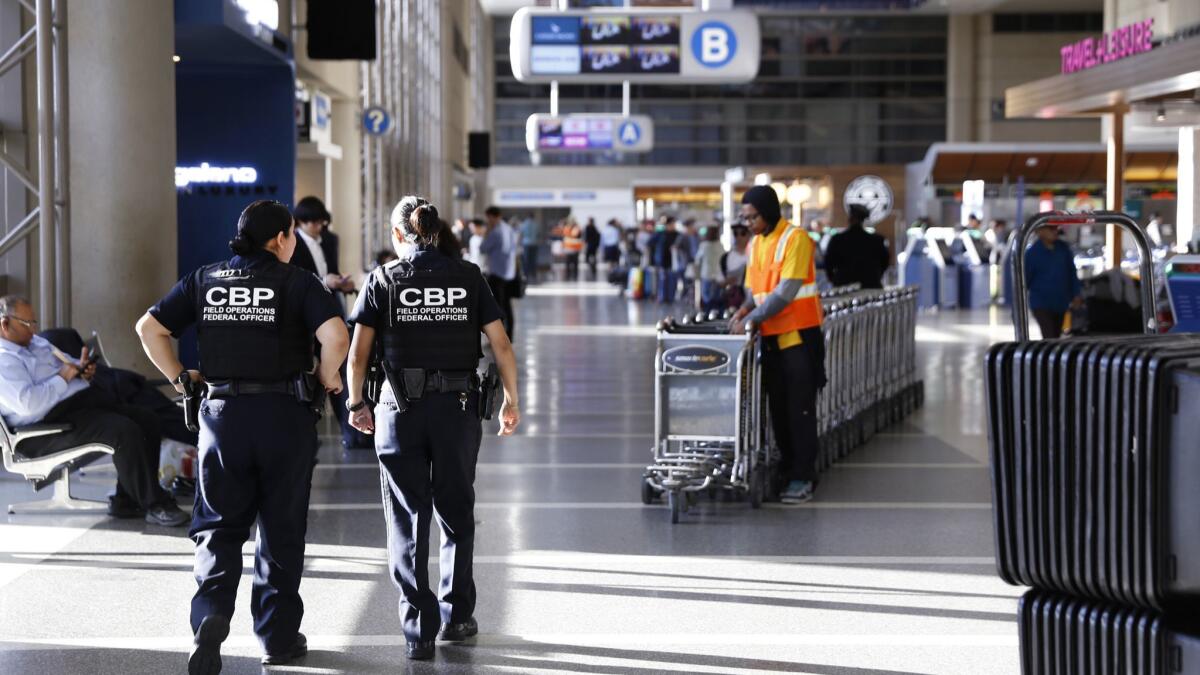Op-Ed: Two years in, Trump’s travel ban is still ruining lives

- Share via
Two years ago this month, on Jan. 27, 2017, I was at the U.S. Embassy in Madrid as a consular officer when President Trump signed an executive order he labeled: “Protecting the Nation From Foreign Terrorist Entry Into the United States.” It quickly became known as the travel ban.
The order — with its misspellings and misstatements of facts and law — was an outrage to most of us who would have to enforce it overseas. Immediately, State Department officials organized against it. Thousands of us signed a memorandum arguing that “such a policy runs counter to core American values of nondiscrimination, fair play, and extending a warm welcome to foreign visitors and immigrants.”
We weren’t alone in our opposition. Lawsuits were filed, federal judges stepped in, and thousands of Americans rushed to the airport to support travelers.
At the time, it seemed that such widespread and bipartisan outrage could only result in a quick end to the errant and illogical policy. I assumed that an action so clearly rooted in the president’s discriminatory animus toward those of the Islamic faith couldn’t stand. And so I waited.
President Trump won, and he wins every day we do not talk about how the travel ban affects real people.
I waited for State Department officials to walk out en masse. I waited for Congress to demand its retraction and launch investigations. I waited for the Supreme Court to quickly intervene.
As a consular officer and U.S. diplomat, trained and steeped in American politics and history, I assumed checks and balances would kick in. I was wrong. President Trump, for all his faults, understood the depth of U.S. tribalism far better than those of us who opposed him.
Moreover, the acquiescence of so many emboldened him to continue taking drastic actions to curtail legal entry to the United States, including separating families at the border, gutting established asylum procedures and, most recently, shutting down the government to try to get funding for his border wall.
All that began with the Muslim Ban.
I spent a year waiting for America to be America again, and in that year, I watched as some of my colleagues went from anger to acceptance and finally, even, defense of a policy they had initially considered ridiculous and rooted in discrimination.
As officers and diplomats, we had all been shocked at then-candidate Trump’s call in 2015 called for “a total and complete shutdown of Muslims entering the United States.” But were cheered by the fact that it wasn’t just Democrats who excoriated the policy, but also other Republicans. Over time, though, Trump refined his plans, targeting only the weakest Muslim countries, and he gained support.
In the end, I felt I had no choice but to quit the State Department and try to promote change. I wrote an affidavit that was filed with the Trump vs. Hawaii case before it went to the Supreme Court. In it, I explained that the waiver process supposedly in place to allow some travelers from banned countries to enter the United States was a sham.
The affidavit was cited by Justice Stephen Breyer in a dissenting opinion in the case Trump vs. Hawaii but was not enough to overturn the ban. The courts in the end bought into the fiction that somehow Trump’s multiple campaign statements calling for a ban on Muslims were unrelated to the policy he enacted within days of his inauguration.
President Trump won, and he wins every day we do not talk about how the travel ban affects real people. Arguably it will stand as the most successful immigration initiative of his presidency — as the only wall Trump successfully built.
The proof of the policy’s success is in the numbers. The State Department just released its 2018 visa numbers, and despite a supposed process for granting waivers to the ban, visa issuances to people from Yemen, Syria, and Iran have come to a virtual halt when compared to the numbers from 2016. Even majority Muslim countries unaffected by the ban such as Egypt, Jordan, Iraq, Pakistan and Turkey have seen declining visa issuances since Trump’s ban was put in place.
Enter the Fray: First takes on the news of the minute »
When I quit the State Department, I became an immigration attorney to help people navigate this system. I wanted to atone for sitting by idly for a year hoping that America would remember its character.
In my new life, I’ve worked with an Iranian American doctor at one of the best hospitals in the United States who has been told he will have to wait perhaps a year or longer before he can see his Iranian-born spouse. I’ve worked with bright Yemeni students waiting for visas that may never be granted through an almost fictional waiver process. And I’ve spoken to former colleagues who say they are trying to fight the good fight and attempting to grant as many waivers as possible despite administrative roadblocks from Washington, D.C.
The United States has moved on in the two years since Trump issued his first travel ban, but for those affected by it, the wound remains fresh.
I can’t forget that day at the U.S. Embassy when I learned my government had turned its back on principle and on those of the Islamic faith. I hope, as the 2020 presidential election heats up, others remember it, too.
Christopher Richardson is an immigration attorney and former State Department official.
More to Read
A cure for the common opinion
Get thought-provoking perspectives with our weekly newsletter.
You may occasionally receive promotional content from the Los Angeles Times.










